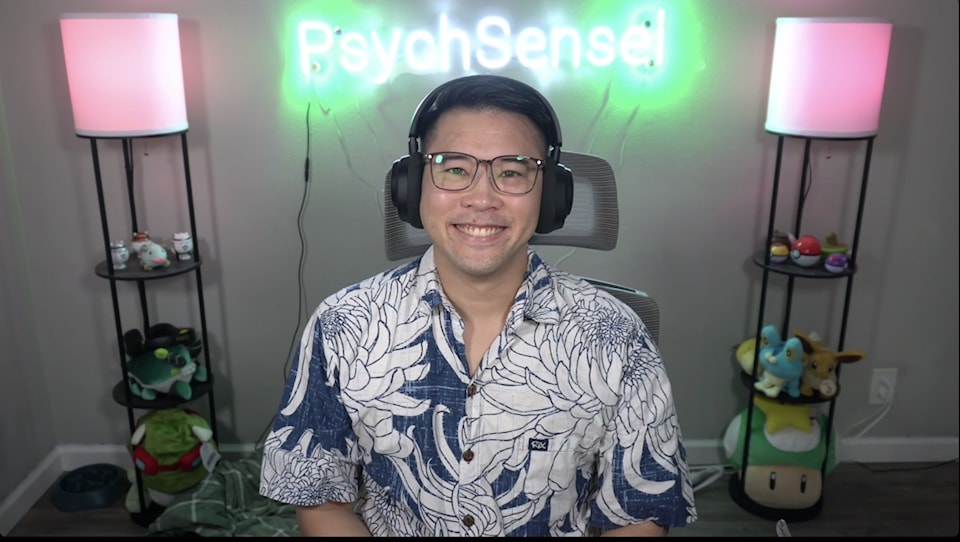Ryan Terao said his “origin story” as a psychologist began after seeing the compassion and love his mom conveyed to him and his sister as a school counsellor.
After completing a doctorate and master’s degree in clinical psychology along with a bachelor’s in psychology and neuroscience from Azusa Pacific University in Azusa, Calif., Terao was welcomed to the world of esports psychology during his time at the University of Southern California (USC) with its student success office.
Since 2019, Terao said he began working with a large variety of clients ranging from well-known franchise teams such as 100 Thieves to collegiate teams such as USC.

Team Lead for Humber Esports, Lina Shim, eventually met Terao during her time as a team manager with a League of Legends Championship Series (LCS) Game Changers team. The tournament took place from July 2023 to September 2023.
Shim said she was thinking of ways to use Humber Esport’s budget to help coach players more when the idea of health and wellness came to her. She said the coach she worked with for the LCS team highly recommended Terao.
“So, we talked to him, we got an agreement for our program, and he came in and helped us,” Shim said. “We didn’t have a lot of money to pay for him because we had a small budget. But Dr. Ryan is a person who is not about the money.”
Shim and Terao did a trial run with one session for both the varsity teams and the coaches. Shim said many people were asking when they would do it again, which encouraged her to continue implementing mental wellness into the curriculum.
The duo worked together since last October to develop a four-session program for the varsity team players and their coaches.
The programs for players consisted of sessions that focused on team cooperation and personal expectations/behaviours, while for coaches, they consisted of sessions that focused on how to work with their players and create positive team cultures.
Both Shim and Terao said they believe mental and physical wellness is important for the overall well-being of esports gamers.
Shim said a common stereotype of gamers is people who are toxic and don’t get along with people because of that toxicity. Even though that is not an issue the teams have, Shim said it shows that having these types of support for gamers is important.
“Just like any sports competition, so much of it is mental. I was telling my team [about] qualities that are great to have but hard to train, [such as] resilience and attitude. Not having to feel down or discouraged about something being over when it’s not even over,” Shim said.
Terao said people are aliens in their own bodies, and until it’s revealed to them, only then can people focus on their inner selves. He does this by making an analogy to the movie Men in Black.
“Your body is bound to your spaceship. You are an alien in Men in Black, eyes on the ship, and you are operating it. How your spaceship is and the quality of your spaceship dictates the ability for you to explore your environment safely, effectively, and efficiently,” Terao said.
Alongside mental wellness, physical well-being is still something Humber Esports sees as important.
Lanvy Nguyen, the current president of Humber Gaming Club, was previously the Health and Wellness coach for the varsity teams last year. Within her time as a coach, the kinesiology student developed a “blueprint guide” with a McMaster co-op student.
The guide laid out the basic needs, nutrition, sleep-time management, stress management, and mental well-being guidelines for varsity players.
Although Nguyen stepped away from the coach position, she hopes the guide will be passed down and updated over the years. She said this type of guide is new, and most online resources lack this information.
Shim said that although they took a step back from the portfolio this semester, she hopes to find ways to implement it again next year, with the team lead hoping to find another health and wellness coach for the winter semester.
She said, for now, players are assigned online modules that emphasize these ideas and practices through things such as wrist exercises or stretching in between periods while sitting at their desks.
Many players had a positive response to the implementation of mental wellness within the varsity team curricula. Shim said the work Terao has been doing with their teams has been highly effective.
“Last year, a couple of teams were in that position where they would regularly practice and see each other, but they wouldn’t call each other close friends. Dr. Ryan was a great resource to get them to open up and not fight or keep to themselves,” Shim said.
One player for the Valorant varsity team, Arthur Gaudio, said the program’s mental and physical wellness implementations saved his well-being in and out of games.
“People don’t really know how important it is, and I’d love to see it get a little more visibility and support. It helped me, and still helps me, a lot, and it’s really going to help the rest of the team,” Gaudio said.
Both Shim and Terao plan to keep working together to continue implementing more strategies and plans in the new year to help players out during the competitive season.
Terao said for people who wish to go into competitive gaming, it needs to be something that they genuinely love to do.
“What do you want to use gaming for? Do you want to learn something? Do you want to progress with this? I don’t want gaming to be something that distracts you and slips into something you’re just doing,” he said. “I want you to understand where it’s going to take you.”



